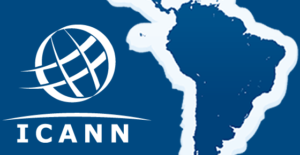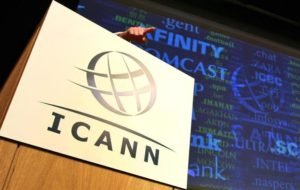The Internet Corporation for Assigned Names and Numbers (ICANN) is a nonprofit organization that is responsible for coordinating the maintenance and procedures of several databases related to the namespaces of the Internet – thereby ensuring the network’s stable and secure operation. ICANN performs the actual technical maintenance work of the central Internet address pools and DNS Root registries pursuant to the Internet Assigned Numbers Authority (IANA) function contract.

Much of its work has concerned the Internet’s global Domain Name System, including policy development for internationalization of the DNS system, introduction of new generic top-level domains (TLDs), and the operation of root name servers. The numbering facilities ICANN manages include the Internet Protocol address spaces for IPv4 and IPv6, and assignment of address blocks to regional Internet registries. ICANN also maintains registries of Internet protocol identifiers.
ICANN’s primary principles of operation have been described as helping preserve the operational stability of the Internet; to promote competition; to achieve broad representation of the global Internet community; and to develop policies appropriate to its mission through bottom-up, consensus-based processes.
ICANN was created on September 18, 1998, and incorporated on September 30, 1998 in the state of California. It is headquartered in the Playa Vista neighborhood of the city of Los Angeles.
Uniform Domain-Name Dispute Resolution Policy (UDRP)
One task that ICANN was asked to do was to address the issue of domain name ownership resolution for generic top-level domains (gTLDs). ICANN’s attempt at such a policy was drafted in close cooperation with the World Intellectual Property Organization (WIPO), and the result has now become known as the Uniform Dispute Resolution Policy (UDRP). This policy essentially attempts to provide a mechanism for rapid, cheap and reasonable resolution of domain name conflicts, avoiding the traditional court system for disputes by allowing cases to be brought to one of a set of bodies that arbitrate domain name disputes. According to ICANN policy, a domain registrant must agree to be bound by the UDRP—they cannot get a domain name without agreeing to this.
Examination of the UDRP decision patterns has caused some to conclude that compulsory domain name arbitration is less likely to give a fair hearing to domain name owners asserting defenses under the First Amendment and other laws, compared to the federal courts of appeal in particular.
Proposed elimination of public DNS whois
The initial report of ICANN’s Expert Working Group has recommended that the present form of Whois, a utility that allows anyone to know who has registered a domain name on the Internet, be scrapped. It recommends it be replaced with a system that keeps most registration information secret (or “gated”) from most Internet users, and only discloses information for “permissible purposes”. ICANN’s list of permissible purposes includes Domain name research, Domain name sale and purchase, Regulatory enforcement, Personal data protection, Legal actions, and Abuse mitigation. Whois has been a key tool of investigative journalists interested in determining who was disseminating information on the Internet. The use of whois by the free press is not included in the list of permissible purposes in the initial report.

As a decentralized network of networks, the Internet does not have a single governance structure. Much of the governance occurs in various standards-setting bodies that decide uniform technical specifications for each of the building blocks that comprise the modern Internet. For example, the Internet Engineering Task Force is responsible for setting core networking standards, the World Wide Web Consortium is responsible for web-related standards (e.g., hypertext transfer protocol, or HTTP), and the Institute of Electrical and Electronics Engineers develops Ethernet and Wi-Fi standards.
Still, some core technical functions have a more centralized management structure. Computers communicate with each other on the Internet using unique identifiers, such as domain names (e.g., .com or .net) and Internet protocol (IP) addresses, which must be unique (like phone numbers, for instance) for the system to function. In the Internet’s early years, Jon Postel, an academic, managed the process of assigning domain names and IP addresses. That changed in 1998, when the responsibility was transferred to the Internet Corporation for Assigned Names and Numbers (ICANN), a California-based nonprofit organization operating under a U.S. government contract, as part of an effort to privatize the management of the day-to-day operations of the Internet.
ICANN manages the allocation of IP addresses and the domain name system (DNS)—the Internet’s address book that translates easy-to-remember domain names, such as CFR.org, into Internet protocol numbers (e.g., 75.101.137.229) that computers require to connect to each other. The policies by which ICANN carries out its functions are set in a multistakeholder fashion, whereby anyone—a business, a nonprofit, an individual, or a government—can participate in the policymaking process, and where decisions are generally reached through rough consensus.
In the late 1990s, as the Internet gained popularity beyond the United States, particularly in Europe and Asia, policymakers began calling for greater government involvement in Internet policymaking for a number of reasons. Many governments were interested in deploying broadband and improving connectivity to drive economic growth. Governments wanted to respond as criminal activity moved online, and a number sought to block certain types of information and monitor online activity.
In addition, certain governments were dissatisfied that a global communications network was primarily being managed by a U.S.-based nonprofit. Russia, for example, raised concerns that as a strategic asset, the Internet should not be under the control of one government. Others claimed that the United States might abuse its role as steward of the domain name system to wipe all websites based in a country’s domain (such as .cn for Chinese websites) off the Internet
Many of these governments, particularly authoritarian ones, have opposed ICANN’s multistakeholder approach. Others, particularly in the developing world, have objected to the proliferation of Internet governance meetings around the world, since they lack the capacity to fund personnel and travel to participate in every event. A single venue, such as a UN body, could offer a one-stop approach for countries with limited means to participate in Internet-related policymaking.
As a result of these concerns, governments prodded the United Nations toward greater involvement on Internet governance issues. The World Summit on the Information Society (WSIS), two global summits that occurred in 2003 and 2005, produced an outcome document called the Tunis Agenda for the Information Society, which
- affirmed that governments, the private sector, civil society, and international organizations all have roles to play in the development and governance of the Internet;
- recognized that all governments should have an “equal role and responsibility for international Internet governance and for ensuring the stability, security, and continuity of the Internet”; and
- created the Internet Governance Forum, a venue where governments and Internet stakeholders could learn about Internet policy issues, such as cybersecurity, the digital economy, human rights online, and critical Internet resources like the DNS.
In an effort to address calls for its internationalization, ICANN created a governmental advisory committee (GAC) to give governments more input into the policymaking process. For example, the GAC provides advice to the ICANN board when it is considering policies that could affect domestic or international law, such as allowing for the creation of new domain names that might conflict with protected geographical areas (e.g., .amazon) or trademark protections (e.g., .champagne) within a country.
Although the WSIS and the GAC made some progress in integrating governments in the management of the Internet, Russia, China, Saudi Arabia, Iran, and others have pushed for a stronger decision-making role for UN institutions.
In 2012, the ITU hosted the World Conference on International Telecommunications, a conference that sought to update the International Telecommunication Regulations, a treaty that regulates international telecommunications traffic. Russia, China, and many developing countries attempted to bring the Internet within the scope of the treaty, which they asserted would give governments more direct input into the Internet’s management. The United States, the European Union, Canada, and Australia fought the effort, countering that ICANN and other technical organizations were more qualified. In the end, eighty-nine countries signed the new regulations; the United States and fifty-four others refused to sign the treaty.
Tensions over the management of the Internet resurfaced in the wake of the Edward Snowden revelations, which indicated that the United States was leveraging its dominant position as a hub for global Internet traffic to collect intelligence. The United States managed to dampen some of the rising protest by announcing in March 2014 that it would launch a transition process to relinquish its contractual oversight of ICANN. The move soothed an irritant that partially drove some governments to demand a greater UN role in the management of the Internet. Nevertheless, countries that advocate for a larger role in the management of the Internet are unlikely to radically alter their position.
ICANN and the ITU have attracted the lion’s share of attention, but there are other international institutions that already contribute to the governance of the Internet. The UN Office on Drugs and Crime (UNODC) is examining the issue of cybercrime and initiated a draft study [PDF] to examine countries’ ability to tackle it. The UN Economic, Social, and Cultural Organization (UNESCO) is exploring the importance of language diversity, online ethics, freedom of expression, and privacy. The UN General Assembly is providing guidance to states on the applicability of international law to cyberspace, the right to privacy online, and the benefits of using information and communication technologies for development, as well as developing a framework for improving the cybersecurity of critical infrastructure.
Outside the United Nations, the World Trade Organization (WTO) is developing rules for electronic commerce, and the Organization for Economic Cooperation and Development (OECD) is providing guidance on cybersecurity, data security, and Internet policymaking. Regional organizations are also developing new capacities. The Asia-Pacific Economic Cooperation (APEC), for example, has a working group led by ministers from member economies to improve digital trade, privacy protections, network infrastructure, and online trust. The Organization of American States (OAS) has adopted a cybersecurity strategy for the Americas region and the members of the Shanghai Cooperation Organization (SCO) have negotiated and signed an information security treaty. The European Union has developed an international cyberspace policy and seeks to promote a digital single market within Europe. State and nonstate actors have also developed their own informal issue-specific groupings, such as the Freedom Online Coalition, to promote human rights online and the London Conference process, which seeks to promote certain norms for state behavior on the Internet.

